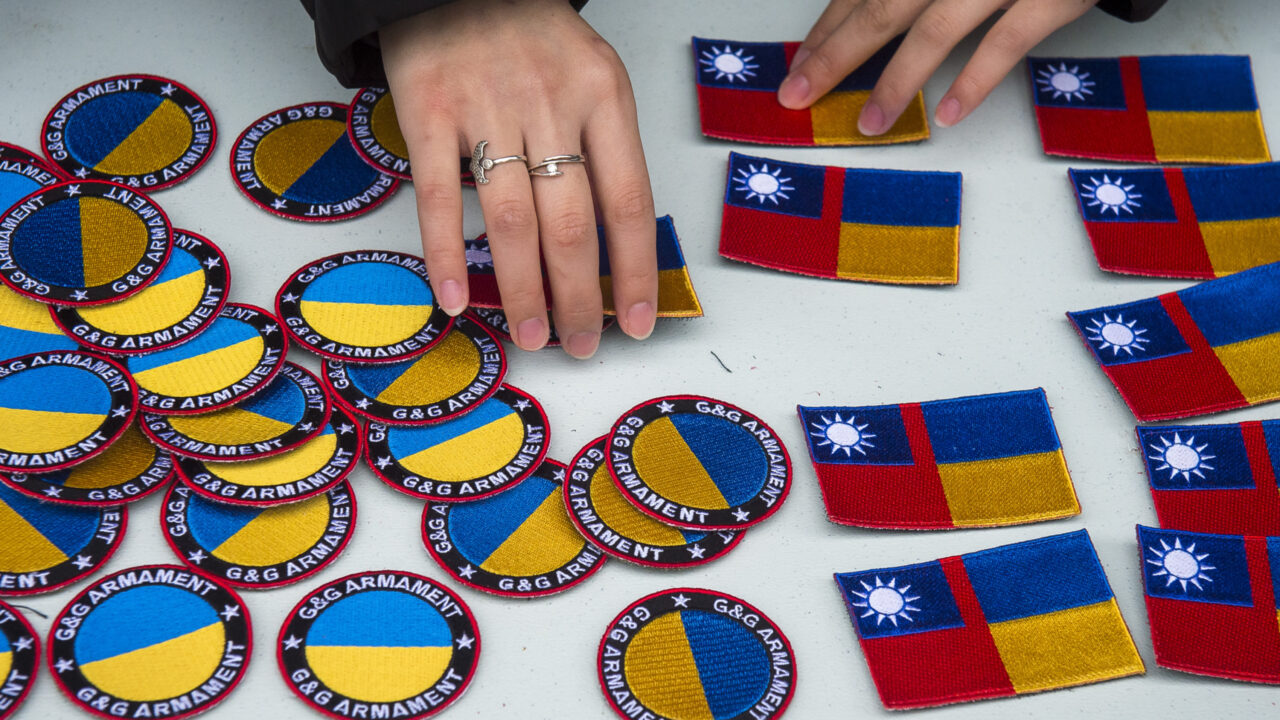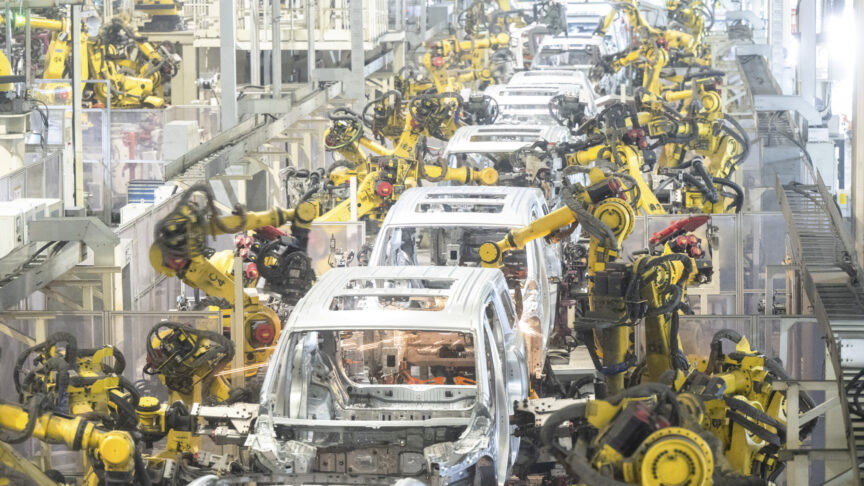How tomorrow never comes: Russia’s war against Ukraine and its impact on Taiwan
After Russia’s invasion of Ukraine, many fear that China could take Taiwan by force. But there is plenty the Taiwanese government can do to avoid the (far from certain) scenario of an all-out invasion – and continue to resist Beijing’s hybrid tactics
“Ukraine today, Taiwan tomorrow” is an oft-heard phrase nowadays on the island of Taiwan. Following Russia’s all-out invasion of Ukraine, many ordinary Taiwanese citizens began taking survival training courses. There, they learn first aid and where to seek refuge should Beijing attack. Some courses even offer firearms training. But this does not mean that panic has broken out in Taiwan. In fact, the atmosphere on the courses is often joyful. People use the expression “wan” – Chinese for “play” – to describe what they are doing: “Let’s play survival training.”
They may be right not to expect all-out war. For years, a hybrid threat of international isolation, disinformation, and grey-zone warfare has been Beijing’s preferred strategy. The Chinese government would prefer to grind the Taiwanese down to the point that they simply surrender to its will than to take the island by military force (even if currently only around 6 per cent of Taiwanese people can imagine unification at some point in the future). The Chinese government knows that a successful military endeavour – as the Russian invasion has proven – is far from certain; the fact that Taiwan is an island, and an amphibious landing would prove a daunting task, makes it even less so.
Yet, the parallels are undeniable. Taiwan and Ukraine are both democracies in the direct neighbourhood of powerful autocratic states that lay claim to their national territory. Both have historical, linguistic, and ethnic ties to their large neighbour. They are both closely intertwined economically with their autocratic neighbours but depend on the United States and its allies for security. However, Ukraine’s experience has also shown that it is possible for a smaller state to defend itself against the aggression of a much larger one.
The Taiwanese government has thus decided that it must greatly improve its lines of deterrence. This is not only a matter of preventing the horror scenario of an all-out invasion, but also of better protecting itself from the hybrid threat that Beijing has long represented. Russia’s war has directly influenced some of the Taiwanese government’s actions. Other changes on the island have been under way for some time. Europeans can provide advice and assistance for many of these things; indeed, Taiwan’s significance as the only democracy in the Chinese-speaking world, its geostrategic position, and its importance to the global economy should motivate political leaders to focus on building up Taiwan’s resilience in several domains.
Army and infrastructure
The poor performance of the Russian army in Ukraine has made the Taiwanese acutely aware of their military shortcomings. Historically, Taiwan’s military emerged from the Kuomintang army, which was developed with Soviet support in Canton, China, in 1925. Many of the structures inherent in the Russian army also feature in that of Taiwan, such as the hierarchical command structure, the ineffective reservist system, and the poor training of recruits.
When Taiwan’s government decided last December to extend compulsory military service to one year, almost 80 per cent of Taiwanese were in favour – an astonishing approval rate in a society that is usually quite divided. Until then, military service had lasted for four months. Recruits described it as a kind of summer camp, at which the instructors were mainly concerned with cleanliness and ensuring their protégés did not injure themselves. The army should now improve its training procedures. The military suffers from logistical issues too. According to insiders, no one really knows how many tanks and weapon systems are actually in combat-ready condition. Even pro-government observers admit in private that the structures within the leadership are antiquated. The island state urgently needs modern civilian oversight of its military.
Taiwan needs to prepare for a blockade, a scenario Beijing is already rehearsing through its military manoeuvres
An island may be difficult to invade, but it is easy to cut off from the rest of the world. Taiwan therefore needs to prepare for a blockade, a scenario Beijing is already rehearsing through its military manoeuvres. Military insiders suggest that Taiwan has oil reserves for 90 days, but only two weeks’ worth of liquefied natural gas (LNG) and only three LNG terminals. The current government would like to build another, but has faced environmental protests.
Another challenge is potential attacks on the island’s digital infrastructure. Beijing could try to isolate Taiwan by cutting all submarine cables that connect it to the rest of the world. To ensure the island stays connected, the government will install 700 satellite receivers by next year, some in fixed locations, others on vehicles. Ukraine has been served by tech billionaire Elon Musk’s Starlink satellite internet service since the start of the war. Having witnessed the extent to which Ukraine is dependent on the whims of a single provider, even one single ego, Taiwan’s digital minister Audrey Tang is cooperating with several providers to avoid this scenario.
Economics and politics
Despite the conflict, China remains Taiwan’s most important trading partner. For the past eight years, however, Taiwanese business people have been redirecting their investment elsewhere. The Taiwanese president, Tsai Ing-wen, has pursued a policy of diversification. Her “southbound” policy promotes trade with south and south-east Asia, Australia, and New Zealand. Last year, Taiwan’s investment in these countries combined amounted to about 35 per cent of its total overseas investment, outstripping investment in China for the first time.
Moreover, in recent years, China’s appeal has dwindled as a place for Taiwanese to do business. Beijing has pivoted towards supporting domestic industries, and Taiwanese entrepreneurs have been displaced by mainland Chinese supply chains. Wages are on the rise. Beijing’s “zero-covid” policy stifled business, and the subsequent recovery has remained sluggish. But what worries Taiwanese businesspeople the most is the political risk that has swept up even prominent Chinese business impresarios such as Alibaba co-founder, Jack Ma. In recent months, Beijing has detained several people with links to Taiwan. In April, for example, a Taiwan-based publisher was detained in China on the grounds that he allegedly endangered national security. As geopolitical tensions rise, so does political risk.
Ahead of Taiwan’s crucial presidential election in January 2024, Beijing continues to try to influence the island’s electorate in its favour with massive disinformation campaigns. The Swedish research institute V Dem found that Taiwan is more exposed to disinformation from a foreign state than anywhere else in the world. A recurring theme recently has been Beijing’s attempt to sow doubts among the Taiwanese people as to whether the US would really stand by them in the event of an invasion. The visit from then speaker of the US Congress, Nancy Pelosi, to the island in August last year dispelled some of this doubt, with the number of Taiwanese believing that the US would send troops in the event of an invasion rising from 40 per cent in March 2022 to 49 per cent in August. In April 2023, 55 per cent of Taiwanese believed so.
This underlines the importance of European support for Taiwan. European leaders should show the Taiwanese that they are willing to stand up for their shared values and interests, including a rules-based international order, and that they will do so in practical ways. High-level political contacts are only possible within tight limits due to Taiwan’s lack of recognition as a state (in Europe, only the Holy See recognises Taiwan, alongside 12 mostly small countries worldwide), but Europeans can still foster political, economic, technological, academic, and cultural exchange with the island. Moreover, Europeans should not buy into Chinese government propaganda of “reunification” – Taiwan has never been part of the People’s Republic of China. Finally, they should help Taiwan recover its status as an observer state at the World Health Assembly – a position it held from 2009 to 2016.
China is looking to grind Taiwan down; Europeans can play their part in gradually but determinedly helping build Taiwanese resilience across the board. Doing so will also send a message to Beijing: a lot can be done to avoid “Ukraine today, Taiwan tomorrow.”
Angela Köckritz is a German author and journalist. She was the China and Africa correspondent for Die Zeit, has written two books, and received numerous awards for her journalistic work. She returned from Taiwan in May 2023, after spending three months as a guest scholar on a Taiwan scholarship at the National Chengchi University.
The European Council on Foreign Relations does not take collective positions. ECFR publications only represent the views of their individual authors.



